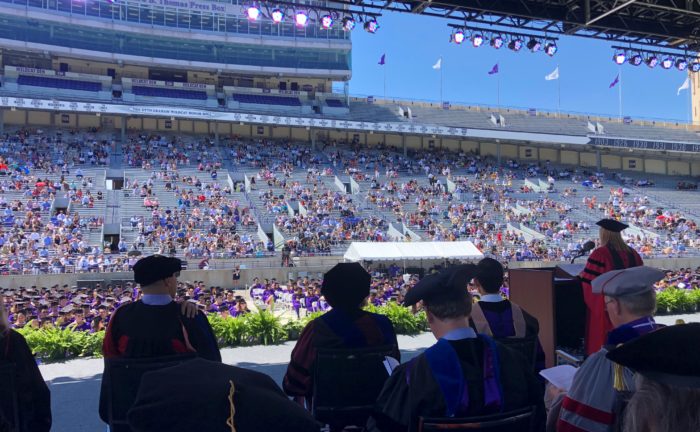
Financial Advice for Graduates – 2021
Last week I attended the Kellogg School of Management’s commencement ceremony. It was a spectacular event: a beautiful day with blue skies and pleasant temperatures, inspiring speeches and enthusiastic graduates. Simply being there in-person felt like a gift.
Each year I provide some financial advice to graduates. I am a marketing professor, not a finance professor, so note that these learnings are from experience and general business knowledge, not statistical models.
The 2021 edition has some similar themes as well as some new points.
Avoid the Get Rich Quick Schemes
This seems to be the Year of Getting Rich Quick. Put all your money into GameStop or Dogecoin and watch it grow. Easy and fun!
This is a terrible approach; there is just too much volatility. I have no problem with putting a little bit of money into speculative investments; it is a great way to learn, and more likely to work out well than going to the casino. But for the bulk of your savings look for things that have real value.
Keep It Simple
For most of you, managing your investments will be the third or fourth or ninth priority in your life. So keep things simple. Have just a handful of accounts. Don’t buy and sell. Just consistently save money, and invest it.
It doesn’t have to be complicated: use a mix of index funds or ETFs, individual stocks and short-term bonds.
• Broad index funds or ETFs are cheap and relatively safe, and ensure that you won’t miss out on the next Apple.
• Individual stocks are cheaper to hold (free!) and supremely tax efficient. You can sell the losers and take a loss on your taxes, and you can give the winners to charity. In general, just buy and hold individual stocks, forever.
• Short-term bonds are safe. You can get a fund or ETF, or just buy individual bonds or CDs. Some people argue you should avoid these due to the low returns, but I disagree. When the stock market falls 30% or more, the safe money provides great comfort.
A side note: If you are in a high tax bracket, giving away a highly appreciated stock is almost free. You can deduct the roughly 40% federal tax rate and perhaps a 5% state tax rate. You also avoid the 25% capital gains tax. Put it together and that donation is about 70% avoided taxes, and only 30% after tax money. If you are in a high-tax state like California, the donation might be 75% or more avoided tax. Amazing but true.
Be a Voice of Reason
There are some crazy financial ideas floating around these days. Some people think the government can borrow unlimited amounts. It can’t.
Other people think you can tax the wealthy at 90% incremental rates and they won’t leave or find some way around the taxes. They will.
Still others think there is no role for the government at all and we should basically get rid of it. This is a terrible idea; we’ve seen this year the important role government plays in our economy.
And then there are people who think paying huge unemployment benefits doesn’t diminish people’s incentive to get a job. It does.
As a Kellogg graduate, you know more than perhaps 99% of people when it comes to business and management. Your perspective is important.
So speak up and share it. Lobby for effective policies that help our community. If Kellogg graduates don’t step forward and enter the discussion, the stage will be occupied by people with strange views. Being silent simply let’s other people dominate the narrative and set the policies.
Spend Wisely
At Kellogg’s ceremony, I was struck by the common theme in the talks: this has been a traumatic year. But we are here. We survived: battered, exhausted, thankful.
I don’t think we know what to make of the pandemic. The speakers seemed unsure, for obvious reasons. We are still processing it.
But I think there are a few things we have learned. Life is fleeting. Things can change quickly. We deeply value friends and colleagues. We must help each other, especially those with fewer opportunities.
So spend your time and money wisely. Support causes that you care about. Invest in special experiences that you’ll remember. Don’t buy lots of stuff: things won’t make you happy and the disposable economy is bad for the environment. Go to a great dinner with friends.
Ultimately this pandemic year has shaken us all, but it has taught us just how important our family, friends, colleagues and community are to our life. Invest wisely.
Good luck.
Good note. I would add in the advice not to check your portfolio every day or every hour. Maybe once a week. Maybe even once a month. There is a good Warren Buffett quote too which I like: “The stock market is a device for transferring money from the impatient to the patient.”